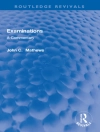Does populism indicate a radical crisis in Western democratic political systems? Is it a revolt by those who feel they have too little voice in the affairs of state or are otherwise marginalized or oppressed? Or are populist movements part of the democratic process?
Bringing together different anthropological experiences of current populist movements, this volume makes a timely contribution to these questions. Contrary to more conventional interpretations of populism as crisis, the authors instead recognize populism as integral to Western democratic systems. In doing so, the volume provides an important critique that exposes the exclusionary essentialisms spread by populist rhetoric while also directing attention to local views of political accountability and historical consciousness that are key to understanding this paradox of democracy.
Table des matières
Introduction: Populism and its Paradox
Bruce Kapferer and Dimitrios Theodossopoulos
Chapter 1. From “The People” to “The Citizens”: The Possibilities and Limitations of Populist Discourse in Argentina
Victoria Goddard
Chapter 2. The Brazilian Crisis and the Ghosts of Populism
John Gledhill
Chapter 3. Lurching between Consensus and Chaos: Shades of Populism in Australian Indigenous Policy
Melinda Hinkson and Jon Altman
Chapter 4. Populism’s Claims: The Struggle between Privilege and Equality
Susana Narotzky
Chapter 5. How Populism Works
Michael Herzfeld
A propos de l’auteur
Dimitrios Theodossopoulos is Professor of Social Anthropology at the University of Kent. He is the author of two ethnographic monographs: Troubles with Turtles (2003), and Exoticisation Undressed (2016); and the editor of multiple collections.












